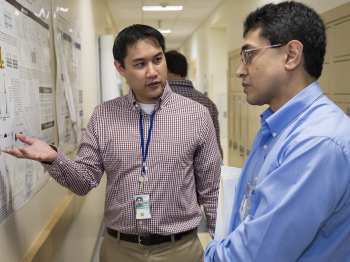The POB provides a unique opportunity for graduate students interested in pursuing a research experience that exposes them to a translational research environment. This dynamic setting enables students/fellows to learn basic pathophysiology of pediatric solid tumors and leukemias as well as current clinical therapies and experimental clinical approaches for the treatment of children with cancer. The NIH campus provides access to investigators utilizing basic model systems, systems biology, the latest genomic interrogative systems as well as translational research environments which synergize to decipher the pathophysiology of human disease in order to improve the health of children.
While the NIH does not have formal degree-granting authority, it has partnered with a number of institutions in the greater metropolitan DC area as well as around the country (see NIH Graduate Partnerships Program) and increasingly around the world with the NIH Oxford-Cambridge Scholars Program or the NIH-Karolinska Program. Also a number of Medical Schools have programs that enable students earning their MD to stop the MD clock and study for a PhD. Finally, Pediatric-Hematology Oncology Fellows during their Fellowship training can also study for their PhD.
